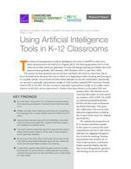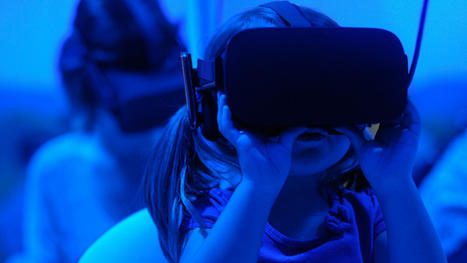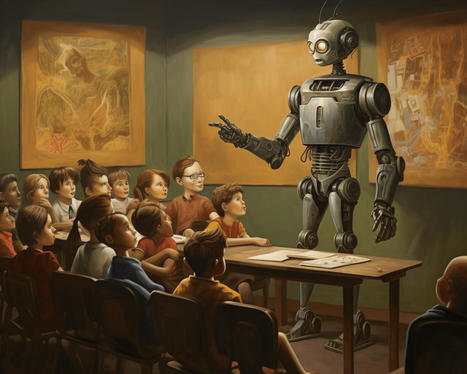 Your new post is loading...
 Your new post is loading...
The pandemic disrupted education and resulted in learning losses, but it also helped kickstart adoption of generative AI such as ChatGPT. Now, we have the opportunity to mobilize AI to help bolster the education sector—especially those regions hit hardest by learning losses,
The release of such generative artificial intelligence (AI) tools as ChatGPT in 2022 was a major advancement in the field of AI. Two burning questions for kindergarten through grade 12 (K–12) educators are to what extent new generative AI tools will change teaching and whether they will improve learning.
The answers to these questions are not yet clear and likely will not be for some time. But to learn firsthand from educators the ways in which AI is beginning to affect teaching and learning in K–12 public schools, the authors surveyed and interviewed educators across the United States. Specifically, the authors surveyed a nationally representative sample of 1,020 teachers using RAND's American Teacher Panel in fall 2023. They also surveyed a nationally representative sample of 231 districts in fall 2023 and interviewed 11 leaders from these districts in December 2023 and January 2024. The districts the authors surveyed and the leaders they interviewed are members of the American School District Panel (ASDP). The ASDP is a research partnership between RAND and the Center on Reinventing Public Education.
The authors combine the perspectives of K–12 teachers and district leaders in this report to construct the most comprehensive picture to date of how educators are engaging with AI products and tools for teaching. Teachers reported how they actually use AI tools in their practices, and district leaders reported whether and how they are providing policies, guidance, and training on the use of AI tools.
Key Findings
As of fall 2023, 18 percent of K–12 teachers reported using AI for teaching and another 15 percent have tried AI at least once.
Middle and high school teachers and those who taught English language arts or social studies were more likely to be AI users.
Among those teachers who use AI for teaching, most were using virtual learning platforms, adaptive learning systems, and chatbots on a weekly basis.
The most common ways that teachers used AI tools were to adapt instructional content to fit the level of their students and to generate materials.
By the end of the 2023–2024 school year, 60 percent of districts plan to have trained teachers about AI use. Urban districts were the least likely to deliver such training.
In interviews, leaders described focusing more on increasing teachers' AI use and less on crafting student use policy, primarily because they saw the potential for AI to make teachers' jobs easier.
How artificial intelligence (AI) will affect learning is a hot topic that some educators view with fear, suspicion, and panic. In fact, many schools have completely barred machine learning from classrooms when they should be harnessing its power and embracing it instead.
Like it or not, the AI genie is out of the bottle, and those who don’t learn the pros and cons of using this cutting-edge technology may be left behind. The future of education should always be rooted in adapting, adopting, and evolving. Adding AI to the mix is just the natural next step in that ongoing journey.
Via Edumorfosis
Attacks on education in West and Central Africa have increased in the past 10 years and universities have not been spared, according to the United Nations Educational, Scientific and Cultural Organization, or UNESCO.
Issuing the warning at the end of February in several briefing papers, UNESCO stated that most of the attacks occurred in Burkina Faso, Cameroon, the Democratic Republic of the Congo, Mali, Niger and Nigeria and were perpetrated by armed conflict groups and government armed forces.
In one of the background papers, ‘Safeguarding education: Policy and data landscapes for the protection of education from attack in West and Central Africa’, UNESCO noted that, since 2017, armed Islamist insurgent groups have been targeting the higher education sector in Burkina Faso. Universities that have been forced to suspend classes from time to time include Dori University and the University of Fada N’Gourma.
In Cameroon, armed separatist groups driven by concerns about the marginalisation of the English-speaking north-west and south-west regions of the country have been engaged in a boycott of education since 2017.
The University of Buea and the University of Bamenda, which are located in those areas, have been under attack several times. According to UNESCO, attacks on education in the far north region of Cameroon have also been carried out by Boko Haram, spreading over the border from Nigeria.
Similarly, in the Democratic Republic of the Congo, attacks on education have escalated since 2012, following the outbreak of conflict between the M23 rebel group and the Congolese armed forces, or FARDC, and institutions in the eastern provinces of North Kivu, South Kivu and Ituri have been the most heavily impacted. “Attacks are carried out by the FARDC, M23, Hutu militia groups, the Democratic Forces for the Liberation of Rwanda, and the Allied Democratic Forces,” says UNESCO.
In Mali, schools and universities are also exposed to rebel attacks. Last year, the United Nations reported that about 1,500 out of 9,000 schools in the country were closed or non-functional as a result of insecurity, disrupting the education of half a million learners.
One of the higher education institutions at risk in Mali is the prestigious L’Institut des Hautes Etudes et de Recherches Islamiques Ahmed Baba de Tombouctou (Ahmed Baba Institute of Higher Learning and Islamic Research) in Timbuktu, which is still recovering from a 2012 attack. According to UNESCO, the institute has manuscripts of the history of Mali dating from the 14th and 16th centuries.
Implications for the future of education Developments in generative AI raise fundamental questions for the future of education.What will be the role of teachers with this technology in wide circulation? What will assessment look like now that AI utilities can perform very well on examinations that were, until very recently, widely considered un-hackable, such as tests to demonstrate mastery of specific subject areas, and exams to credential skilled professionals, including doctors, engineers, and lawyers? Generative AI and the future of education4As a university professor, I have long considered the teaching of writing to be one of the most effective ways to cultivate and demonstrate analytical and critical thinking skills. But generative AI invites me to question such assumptions, even as I continue to hold them.In a world where generative AI systems seem to be developing new capabilities by the month, what skills, outlooks and competencies should our education systems cultivate? What changes are needed in schools and beyond to help students navigate a future where human and machine intelligence seem to be ever more closely connected – one supporting the other and vice versa? It is possible that we will soon achieve artificial general intelligence – a milestone at which machines will surpass us not only in narrow areas such as playing chess, but also in much larger ones, such as recommending actions to mitigate the dangers of climate change. What then should education look like? What will be its purpose and role in a world where humans are not necessarily the ones opening new frontiers of understanding and knowledge?These are daunting questions. They are forcing us to seriously consider concerns that we have, arguably, avoided for too long. At their most basic level, these concerns relate to the sort of world we want to live in. Our education systems often take for granted what the world looks like – and will and should look like. Our formal learning systems are designed to help people develop the competencies needed to navigate and, we hope, thrive in this known world. AI is forcing us to ask questions about the ‘known-world’ that we usually take as a starting point for education. Many of our old assumptions and norms, especially those concerning knowledge and learning, appear unlikely to sustain the ‘weight’ of this new technology. We can no longer just ask ‘How do we prepare for an AI world?’ We must go deeper: ‘What should aworld with AI look like? What roles should this powerful technology play? On whose terms? Who decides?’ Education systems need to return agency to learners and remind young people that we remain at the helm of technology. There is no predetermined course.
Proponents of AI say that tools like ChatGPT will bring significant benefits. It can assist teachers, personalize learning with AI-powered tutoring systems and automate administrative tasks, allowing educators to focus more on teaching and mentoring students. However, current educational challenges in access, equity and inclusion in education can be significantly magnified by digital exclusion, lack of connectivity and the digital readiness of countries. On top of these challenges, we have many education systems still attached to teaching methods based on memorization, lack of relevance and engagement as well as poor and short-sighted standardized assessments that can hamper the effective integration of AI for an inclusive and quality education.
Artificial Intelligence–AI–has been around a long time, but caught everyone’s attention with the launch of generative AI, ChatGPT, and DALL-E. These made using AI easy enough for …
In the evolving landscape of education, one topic has taken center stage: generative AI. As educators, we tend to be on a continuous quest for innovative edtech tools that will enhance the learning experience for students. The potential of generative AI is both promising and profound, but it raises critical questions: How can this transformative technology be harnessed not only to educate but to empower inclusively and equitably?
In the second part of their series looking at 100 ways to use ChatGPT in higher education, Seb Dianati and Suman Laudari share 25 prompts for such AI tools to assist with teaching and assessment
Potential to undermine the status of teachers and the necessity of schools
The paper underscores that education should remain a deeply human act rooted in social interaction. It recalls that during the COVID-19 pandemic, when digital technology became the primary medium for education, students suffered both academically and socially. The paper warns us that generative AI in particular has the potential to both undermine the authority and status of teachers, and to strengthen calls for further automation of education: Teacher-less schools, and school-less education. It emphasizes that well-run schools, coupled with sufficient teacher numbers, training and salaries must be prioritized.
Education spending must focus on fundamental learning objectives
The paper argues that investment in schools and teachers, is the only way to solve the problem that today, at the dawn of the AI Era, 244 million children and youth are out of school and more than 770 million people are non-literate. Evidence shows that good schools and teachers can resolve this persistent educational challenge – yet the world continues to underfund them.
What role does vocational education and training play in countries’ education systems?
Vocational education and training (VET) is a key component of most education systems in OECD countries. About one in three 25-34 year-olds have a vocational qualification as their highest level achieved, whether at upper secondary, post-secondary non-tertiary or short-cycle tertiary level.
The bulk of vocational training is delivered at upper secondary level. More than two-thirds of students pursuing vocational education are enrolled in an upper secondary programme.
VET programmes also serve learners who are no longer in initial education. VET provision includes occupational training for adults, upskilling and reskilling, and second chance programmes that are part of the formal education and training system. For this reason, students enrolled in vocational programmes are often older than those in general ones. On average across OECD countries, the average age of enrolment in upper secondary education is higher for students in vocational education (21 years) than for students enrolled in general education (17 years). About two-thirds of the 20-24 year-old upper secondary level students are in VET programmes.
As professors grapple with new technologies in the classroom, a report from Cornell offers suggestions for best practices and policies related to generative artificial intelligence.
In the ever-evolving landscape of education, the battle between blended learning and traditional learning approaches continues to rage on. These two educational paradigms represent distinct methodologies, each with its own set of advantages and disadvantages. As the digital age progresses, the conversation about which is superior intensifies, leaving educators and learners pondering which path to choose. In this comprehensive exploration, we will dissect the concepts of blended learning and traditional learning, weighing their merits, and attempting to discern the most effective route to academic success.
|
EdTech has been a hot button topic for some time now, and the focus on generative AI in 2023 has only amplified interest in EdTech. Proponents see a plethora of ways that AI can improve education outcomes. AI’s potential for transforming education is real, but so are the dangers—so we must move forward with care and intentionality. It is with an eye toward care and intentionality that members of W2050’s Senior Fellows committee on education and work met to discuss how AI could—and how it should—impact education in 2024 and beyond.
t is increasingly common to interact with products that seem “intelligent”, although the label “artificial intelligence” may have been replaced by other euphemisms. Since November 2022, with the emergence of the ChatGPT tool, there has been an exponential increase in the use of artificial intelligence in all areas. Although ChatGPT is just one of many generative artificial intelligence technologies, its impact on teaching and learning processes has been significant. This article reflects on the advantages, disadvantages, potentials, limits, and challenges of generative artificial intelligence technologies in education to avoid the biases inherent in extremist positions. To this end, a systematic review has been carried out of both the tools and the scientific production that has emerged in the six months since the appearance of ChatGPT. Generative artificial intelligence is extremely powerful and improving at an accelerated pace, but it is based on large language models with a probabilistic basis, which means that they have no capacity for reasoning or comprehension and are therefore susceptible to containing errors that need to be contrasted. On the other hand, many of the problems associated with these technologies in educational contexts already existed before their appearance, but now, due to their power, we cannot ignore them, and we must assume what our speed of response will be to analyse and incorporate these tools into our teaching practice.
Keywords: Artificial intelligence – qualification recognition – higher education – credential evaluation – ethics – education fraud – Lisbon Recognition Convention (LRC) – equity – recognition
workflow – learning outcomes – European regulations – internationalisation – Bologna Process.
The rapid developments of artificial intelligence technologies are increasingly posing questions about the ethical and practical implications of their use in the learning, teaching and assessment
processes.
This publication reflects on the relation between artificial intelligence and recognition of qualifications. Whether this relation may result in an opportunity or a threat, will be developed in the text through a set of questions concerning the possible implications of the use of artificial intelligence in the recognition sector. These questions arise from CIMEA’s experience and have been framed in the context of existing literature and policy documents on the subject, considering five dimensions: equity, recognition workflow, learning outcomes, European framework and regulations and international academic mobility. Moreover, the document attempts to explore the impact on credential evaluation, both in the perspective of recognition workflow, as well as the impact on credential evaluators’ daily work.
The document is targeted at higher education institutions, ENIC-NARIC centres, authorities with jurisdiction in the field of recognition and other entities who, for various reasons, are involved in the recognition of qualifications.
Reflecting on AI and learning, a student offers four insights gleaned from firsthand interactions with ChatGPT.
The OECD Programme for International Student Assessment (PISA) examines what students know in mathematics, reading and science, and what they can do with what they know. It provides the most comprehensive and rigorous international assessment of student learning outcomes to date. Results from PISA indicate the quality and equity of learning outcomes attained around the world, and allow educators and policy makers to learn from the policies and practices applied in other countries. This is one of five volumes that present the results of the eighth round of assessment, PISA 2022. Volume I, The State of Learning and Equity in Education, describes students’ performance in mathematics, reading and science; examines gender differences in performance; and investigates how performance relates to students’ socio-economic status and immigrant background. It also describes how the quality and equity of learning outcomes have evolved since previous PISA assessments.
When artificial intelligence went mainstream with the public release of ChatGPT in November 2022, it immediately sent ripples through the world of education. Concerns about equity in AI, data privacy, and how to teach ethical AI skills became heated topics at faculty meetings and in classrooms. Two things have become clear: This technology is already transforming education—and people have many questions.
Science Friday hosted a virtual conversation with experts in AI and education in October 2023 to understand the potential AI holds for education and some of the pitfalls to be confronted as it comes to schools across the country. While the path forward may be challenging and occasionally confusing, our guests suggest that by allowing students to lead and guiding them to use AI responsibly, education stands to benefit from innovative tools that will, no doubt, change our world. Here, we recap some of the ideas and insights that came out of that conversation.
The global talent gap is long-lamented and continues to grow — in the U.S. alone, there are currently 9.6 million job openings compared to 6.5 million unemployed.
This has many calling for upskilling and re-skilling of existing workforces. However, while many business leaders recognize that need, they are hampered by a lack of time, resources and funds to develop materials on which to train their workers.
This is another area that — like so many others — where generative AI offers transformative promise, according to Cypher Learning. The learning management system provider released a study this week exploring leaders’ challenges with upskilling, their exploration of gen AI in building training materials and the promise the technology holds in repairing the schism between the number of workers and available jobs.
“Generative AI is already transforming employee training,” CYPHER Learning founder and CEO Graham Glass told VentureBeat. “In 2024, the focus will be on reimagining education with AI at its core.”
In understanding the role and potential of ChatGPT in education, this article suggests that ChatGPT has the potential to enhance the education system by providing instant feedback, personalised learning experiences and 24/7 availability. Furthermore, it aims to analyse the different perspectives on ChatGPT and establish a research foundation that contributes to future research, for instance, questions around who is responsible for the content generated by ChatGPT, and how it should be used to assess student learning. The article offers valuable insights for both students and educators looking to understand the role of ChatGPT in education and the future of the education system. It provides the starting point for further discussion and research into the role of ChatGPT in education and the potential it holds to revolutionise the way we learn and teach. The article concludes by calling for further research to fully understand the impact of ChatGPT on education and to determine the most effective ways to integrate it into the classroom.
Generative AI presents both opportunities and challenges for education. In this webinar for educators, we aim to equip you with the insights and strategies needed to navigate this evolving landscape. We focus on instructional strategies to harness the benefits of AI while also nurturing the unique abilities of humans to tackle global challenges in the 21st century.
This webinar will help you to:
Demystify AI: Understand the capabilities and limitations of generative AI. Distinguish human intelligence from AI via analogies and illustrations.
Re-envision education: Embark on a paradigm shift, moving away from a product-focused approach to a process-focused model of education. Embrace the transformative power of the learning process and move beyond transactions where “learning products” are exchanged for grades.
Address concerns about plagiarism: Examine the decline of curiosity and intrinsic motivation in traditional education systems, and advocate for next-generation models of education that foster an ecosystem of motivation and learning.
Maximize educators’ impact: Explore the crucial role educators play in the AI-enhanced learning landscape. Discover concrete strategies to demystify AI, promote the learning process, honour learner agency and cultivate human skills that AI can’t replicate.
The transformative potential of AI in enhancing learning experiences is recognized by academia and international organizations. However, we need more AI in education literacy, research on its impact, and a truly ethical AI implementation to ensure fairness, transparency, and respect for human rights.
The international education community’s commitment to fostering AI education should remain alert, creating a future where AI-powered learning promotes inclusivity, quality, and equity for all learners and an education centred around human interaction rather than seeking to replace it – keeping in mind Paulo Freire’s vision on the importance of a dialogical approach to education, where teachers and students engage in mutual learning and co-construct knowledge.
Frontier technologies are usually heralded and surrounded with promise, their advantages to the fore, with little consideration of the wider societal implications in their ethical and inclusive adoption or use. A cautious approach to the integration of AI in education is needed where further research, diverse multi stakeholders’ engagement and informed decision-making to navigate the complexities of an AI-driven world should be at the highest level of an inclusive education policy agenda.
Education at a Glance is the definitive guide to the state of education around the world. It analyses all levels of education and provides data on topics such as attainment, enrolment, finance and the organisation of education systems. The 2023 edition focuses on vocational education and training (VET) - a vital part of a country’s education system that offers students an alternative to academic-focused education. Readers interested in a summary of the main findings on VET are referred to the accompanying Spotlight on VET (OECD, 2023).
Artificial intelligence (AI) is increasingly becoming one of the disruptive factors in the educational area. AI in the education market has been forecasted to grow by 45.12% annually and reach $10.38 billion by 2026.
In general, e-learning makes education available anytime and anywhere, which has become crucial in the pandemic and remote work era. Corporations, education tech startups, training companies, universities, schools and students — all parties get a lot of prominent benefits from online learning, like covering larger audiences online. At the same time, AI boosts e-learning to a new level by addressing challenges that are not obvious at first glance.
|
 Your new post is loading...
Your new post is loading...
 Your new post is loading...
Your new post is loading...





























✅ Link Daftar ALEXAVEGAS �https://bit.ly/alexavegas88
✅ Link Log in ALEXAVEGAS �https://tinyurl.com/alexavegas
PROMO SPESIAL CASBACK DAN ROLINGAN
BONUS BEBAS BUY SPIN,
BERLAKU UNTUK SEMUA PROVIDER GAME.
TIDAK ADA BATASAN KEMENANGAN / WD.
✅ Minimum Deposit 5RB
✅ Tidak ada batasan kemenangan
✅ Pilihan metode deposit : BANK / E-WALLET
✅ Auto Payment untuk memudahkan deposit.
SALAM JP & MAXWIN